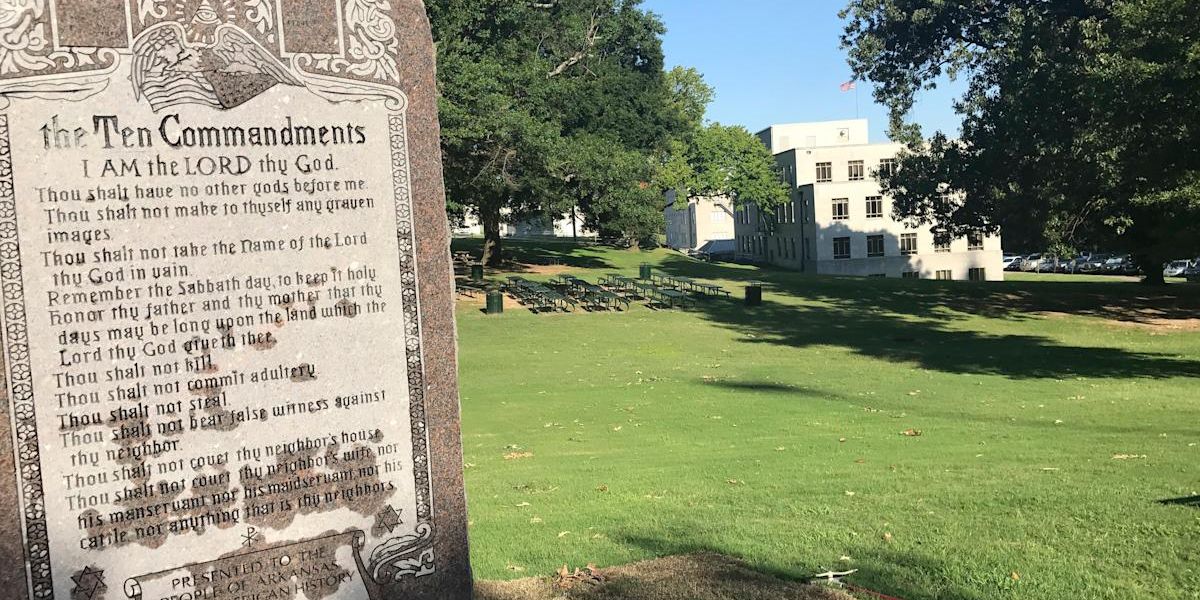Multifaith Lawsuit Challenges Constitutionality of State-Mandated Religious Displays Set to Begin This August
Seven Arkansas families have filed a federal lawsuit to stop a new law that mandates the display of the Ten Commandments in every public school classroom and library, asserting that the policy violates their constitutional rights to religious freedom and parental control over religious upbringing.
Filed on June 11 in the U.S. District Court for the Western District of Arkansas, the lawsuit aims to prevent the enforcement of the law—set to take effect in August 2025—which was signed by Republican Governor Sarah Huckabee Sanders in April. The law requires that the biblical text be posted in a size and location where it is clearly visible to students at all times.
The plaintiffs, who include Jewish, Unitarian Universalist, and non-religious families, are represented by the American Civil Liberties Union (ACLU), Americans United for Separation of Church and State (AU), and the Freedom From Religion Foundation (FFRF). The suit targets four school districts in northwest Arkansas: Fayetteville, Springdale, Bentonville, and Siloam Springs.
Families: Law Imposes “Religious Coercion” in Classrooms
“By imposing a Christian-centric translation of the Ten Commandments on our children for nearly every hour of every day of their public-school education, this law will infringe on our rights as parents and create an unwelcoming and religiously coercive school environment for our children,” said Samantha Stinson, one of the plaintiffs, in a public statement issued by Americans United.
The families argue the law violates the Establishment Clause of the First Amendment, which prohibits the government from endorsing or promoting any particular religion.
The text required under the law must be at least 16 inches wide and 20 inches tall and displayed in a clearly legible typeface, making it impossible for students to avoid during class time. The lawsuit notes that the mandated version aligns with certain Protestant Christian denominations, creating friction for students of other faiths—or none at all—whose beliefs may differ significantly.
“Permanently posting the Ten Commandments in every classroom and library… unconstitutionally pressures students into religious observance, veneration, and adoption of the state’s favored religious scripture,” the complaint states.
It adds: “It also sends the harmful and religiously divisive message that students who do not subscribe to the Ten Commandments… do not belong in their own school community.”
Legal and Civic Implications
The plaintiffs seek a preliminary and permanent injunction to halt the law’s implementation while the case proceeds. Attorneys argue that the law not only breaches federal constitutional protections but also goes against established U.S. Supreme Court precedent, particularly Stone v. Graham (1980), in which the Court struck down a similar requirement in Kentucky for violating the Establishment Clause.
Despite national precedent, Arkansas lawmakers moved forward with the legislation earlier this year as part of a broader agenda to “restore traditional values” in public institutions. The Arkansas Attorney General’s Office has not issued a public comment on the lawsuit as of June 11.
Legal experts say the case could reignite national debate around religion in public schools—a topic that continues to divide communities and courts alike.
Community Voices and National Context
The lawsuit has sparked discussion in communities across Arkansas. While some residents support the move as a return to moral education, others are concerned about the erosion of religious neutrality in taxpayer-funded institutions.
“I send my kids to school to learn math, science, and history—not to be told which religion is right or wrong,” said Maria Goldstein, a parent from Springdale. “This law crosses a line.”
At the national level, the U.S. Department of Education and legal scholars have long warned that classroom religious displays, when mandated by the state, create grounds for legal challenges—especially when those mandates promote one religious viewpoint over others.
As the new school year approaches, the court’s response to the request for an injunction will determine whether the displays begin appearing in Arkansas classrooms this fall.
Were you or your children affected by this new law in Arkansas? Do you believe religion has a place in public education? Share your experience or thoughts in the comments.




